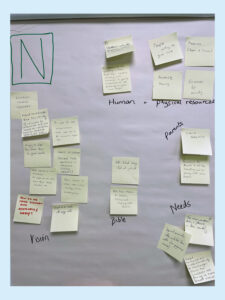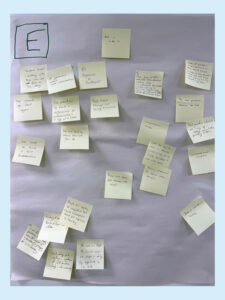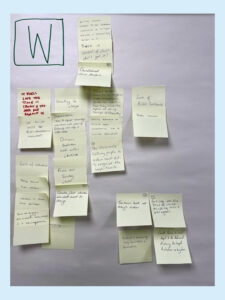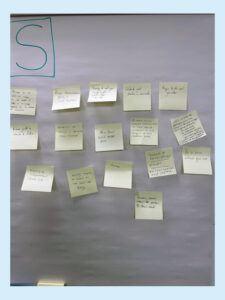Resilient Faith
You can view or download the PDFs of the presentations from this event below.
Videos
You can view the videos we referred to in the presentation below.
Summary Notes
Our meeting on "Resilient Faith" was a rich exploration of the challenges and opportunities facing child discipleship in a post-Christian, hyper-individualised society. The principal theme was the necessity of counter-cultural formation and the integration of new knowledge and tools into discipleship practices. We explored the metaphor of outdated maps which served as a powerful symbol of the need for churches to update their approaches to discipleship, and discussed the impact of cultural formation, the idea of counter formation, and the need for a new approach in the face of a rapidly changing world.
We discussed the importance of forming lasting faith in children through discipleship. Awana shared a framework of "cultural formation" (how the surrounding culture shapes children) versus "counter formation" (intentional efforts to shape children's faith).
Cultural formation refers to the process by which children are shaped by the prevailing cultures in their societies. This process varies greatly depending on the cultural context. For instance, a child growing up in Iraq would be formed within a predominantly Muslim culture, while a child in New York City, Los Angeles, or London would grow up in what we discussed as a post-Christian or highly secularised culture.
The term post-Christian is used to describe a culture that seeks the benefits and outcomes associated with Christian principles, such as justice, love, freedom, joy, contentment, peace, and happiness, without the religious underpinning. This concept is likened to a bouquet of flowers cut off from its roots, with society enjoying the "flowers" but disregarding the source: the triune God, the scriptures, and the local church.
Secularism, defined as the dismissal of God with an emphasis on individualism, was discussed as another significant societal shift. We also talked about the idea of hyper-individualisation, which ties into the notion of expressive individualism, the focus on self-expression and individuality. We explored how this concept has evolved over the last two or three centuries, leading to a complex mixture of cultural formation worldwide.
Awana noted that the past decade has been a wake-up call for those in the U.S., especially those not living on the coast, to understand the impact of these societal shifts on children's discipleship.
Introducing the concept of counter formation, we turned to the teachings of Jesus in Matthew 5-7. "Broad is the path that leads to destruction and many will find it. Narrow is the path that leads to life and few will find it." This can be interpreted as a call to counter-cultural formation. We also looked at Jesus's teachings on prayer, particularly the phrase, "Thy kingdom come, thy will be done on earth as it is in heaven," as a call for discipleship and the importance of counter formation in achieving this.
Awana gave an overview of the evolution of children's ministry in the U.S, talking about a time when the U.S. was a majority Christian culture, and the church's focus was mostly inward. However, they acknowledge this was an illusion and that not enough thought was given to the dominant cultures of the day. Most churches in the U.S. are still in the process of waking up to the new reality, which requires a different approach to discipleship.
The discussion then shifted to the concept of generations and how one's generation affects one's worldview. We discussed how different generations have different experiences with mapping technology, which serves as a metaphor for how they navigate the world and approach discipleship.
Awana used the metaphor of outdated maps to express a concern that many in children's ministry are using outdated methods, or "old maps," based on an understanding of the world that's no longer accurate. This metaphor is illustrated through a series of actual maps, starting from large physical maps, through the development of Garmin technology, to MapQuest, and finally modern app-based navigation systems.
Just as map-making technology has evolved, so too must approaches to discipleship. We looked at a map from the 1500s as an example, showing that while the map creators did the best they could with the information and technology available to them at the time, we now have more knowledge and better tools that should be utilised.
In the same vein, children's ministries, particularly in the U.S., are still operating based on the "old maps" from the '70s, '80s, and '90s. We discussed how we now have more information on political literacy, mental health, relational connection, and belonging, among other things. It's crucial to integrate this new information into discipleship practices, rather than continuing to operate based on outdated models.
We had a discussion around the need to shift from "children's ministry" that is focused on programs and activities, to "child discipleship" that is focused on forming faith. Awana shared a model of discipleship focused on the 3Bs - Belong, Believe, Become.
- Belong refers to creating a relational, welcoming community for children.
- Believe refers to engaging kids with scripture and the gospel message.
- Become refers to helping kids learn to follow Jesus and live out their faith.
We looked at research showing the importance of relationships: how one caring adult can make a huge difference in a child's faith journey. This showed a clear need to equip parents and church leaders for discipleship.
We discussed how our surrounding culture has shifted to be more secular and post-Christian and what this raises in terms of children living out their faith and how parents and leaders can help to bridge divides in this cultural context.
We covered topics such as making church experiential, fostering intergenerational community, and walking with children as they navigate and understand culture, with a clear emphasis on identity formation in Christ.
We discussed the need to delve deeper into the issues of outdated approaches and the need for change and innovation that has transformative potential.
Compass Review
During our session we did a compass review:
- North - What are the Needs
- East - What Excites you
- West - What Worries you
- South - What Steps might we consider
You can view the flip chart notes on this below. Click on an image to view it large. You can right-click to save the images.
Useful Links
Child Discipleship Forum: https://childdiscipleship.com/child-discipleship-forum/
Children's Ministry in a New Reality: https://shop.barna.com/products/childrens-ministry-in-a-new-reality
Lifting the Lid: https://faithfullgeneration.com/lifting-the-lid-forums/




